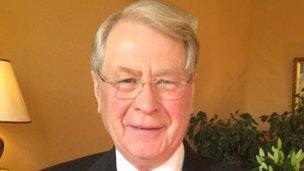Scottish independence: Sir David Edward says Jose Manuel Barroso 'wrong' on EU
- Published

Sir David has sat as a judge at some of Europe's highest courts
A senior legal expert has challenged the opinion of the European Commission president over the status of an independent Scotland in the EU.
Jose Manuel Barroso said last week any new state would be outside EU treaties and would have to reapply to join.
But Professor Sir David Edward, a former European Court judge, believes that Scotland and the rest of the UK would be in a comparable position.
There would be no need for a new accession treaty, he argued.
Instead, negotiations prior to independence would result in amended EU treaties.
Writing on the Scottish Constitutional Futures website, external, Sir David examined both the view of those such as Mr Barroso, who has said a newly independent state would have to apply to join the EU, and that of nationalists who have argued that Scotland would simply continue as a member of the EU after independence.
He said it was his opinion that "neither contention is correct", but as the situation would be unprecedented, and there is no express provision in the treaties to deal with it, it was necessary to look to the spirit and general scheme of the EU treaties.
'Good faith'
He added: "I express no opinion as to whether either Scotland or the Rest of the UK (RoUK) or both would be "successor States" in conventional international law. That question might be relevant in relation to other treaty relationships but not to the EU.
"On those assumptions, my opinion is that, in accordance with their obligations of good faith, sincere cooperation and solidarity, the EU institutions and all the Member States (including the UK as existing), would be obliged to enter into negotiations, before separation took effect, to determine the future relationship within the EU of the separate parts of the former UK and the other Member States.
"The outcome of such negotiations, unless they failed utterly, would be agreed amendment of the existing Treaties, not a new Accession Treaty."
It would be impossible to predict the length and complexity of the negotiation and ratification process, he said, because it would depend largely on the goodwill of those involved.
In part, it would also depend on the extent to which issues were raised beyond those strictly necessary to regulate the future legal relationship of Scotland, RoUK, the EU institutions and the other member states, said Sir David.
'Legal certainty'
He concluded: "It would, of course, be necessary to decide how and by whom negotiations would be conducted. Formally speaking, until the moment of separation, the UK as existing would be the Member State on which the obligation to negotiate would fall, and with which the EU institutions and the other Member States would expect to negotiate.
"How this would be handled as between the constituent parts of the UK would itself be a matter for negotiation - equally in a spirit of good faith, sincere cooperation and respect for the concerns of other Member States.
"In short, in so far as we are entitled to look for legal certainty, all that is certain is that EU law would require all parties to negotiate in good faith and in a spirit of cooperation before separation took place. The results of such negotiation are hardly, if at all, a matter of law."
Sir David was the British Judge of the European Court of First Instance from 1989 to 1992, and of the European Court of Justice from 1992 to 2004. He is a Professor Emeritus of the University of Edinburgh, where he was Salvesen Professor of European Institutions and Director of the Europa Institute from 1985 to 1989.
His opinion was welcomed by Scottish Deputy First Minister Nicola Sturgeon, who said it backed the Scottish government's position.
She added: "This is a hugely welcome contribution to the debate on Scotland's future in Europe from one of the leading experts on the subject, not just in Scotland but anywhere in the continent.
"Sir David's view that negotiations on Scotland's continued European Union membership will take place before independence concurs with the Scottish government's position.
"And his opinion that Scotland's continued EU membership will require a treaty amendment - not an accession treaty - also coincides with our position, especially given that Scotland by definition already meets the EU entry criteria."
But Scottish Conservative leader Ruth Davidson said the comments did not echo the Scottish government's position, adding: "What Sir David Edward is saying is there will have to be negotiation.
"That could take years, involve the creation of border controls and affect the rebate and tax harmonisation.
"These amateur tactics of bluster and assertion show nothing but contempt for the people of Scotland."